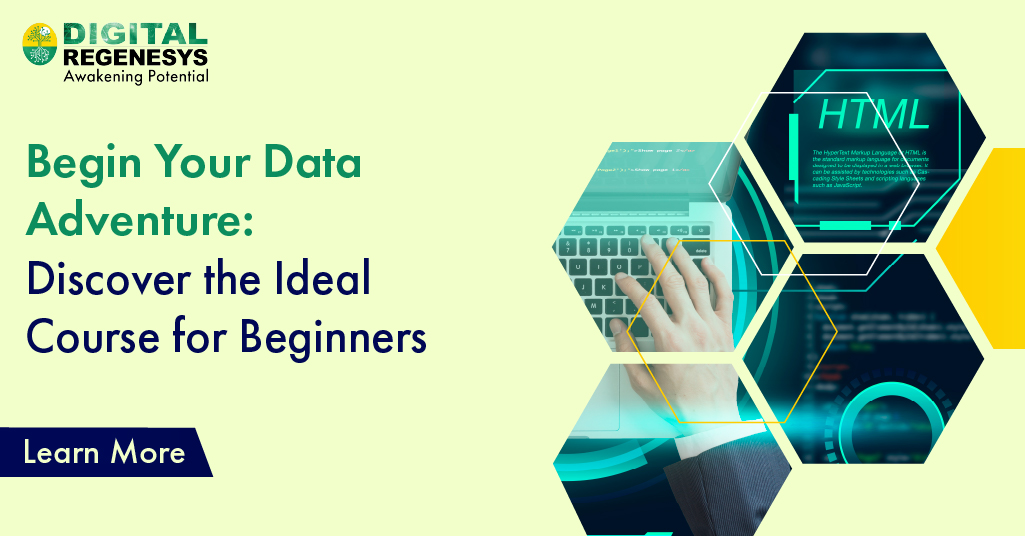What makes data science courses suitable for beginners?

In today’s data-driven world, the field of data science has emerged as a cornerstone of innovation and problem-solving across various industries. The decision to choose an appropriate course to begin their career in this rapidly evolving subject frequently challenges aspiring data scientists. With the abundance of options available, it’s crucial to identify what makes a data science courses suitable for beginners.
In this article, we’ll delve into the key factors that beginners should consider when choosing data science courses online, helping them navigate the path to becoming proficient in this exciting field.
Table Of Contents
- Understanding the Basics of Data Science
- Comprehensive Curriculum Tailored for Beginners
- Hands-On Learning Approach
- Beginner-Friendly Learning Resources
- Supportive Learning Environment
- Clear Progression Path
- Flexibility in Learning Format
- Conclusion
Understanding the Basics of Data Science
Data science encompasses a broad range of techniques, tools, and methodologies used to extract insights and valuable information from data. This field combines techniques from various disciplines, such as statistics, mathematics, computer science, and domain knowledge, to extract insights and valuable information from data. At its core, data science revolves around the process of collecting, analysing, interpreting, and visualising data to make informed decisions and solve complex problems. Beginners embarking on their online data science course journey should have a clear understanding of the foundational concepts, including data manipulation, statistical analysis, machine learning algorithms, and data visualisation techniques.
Comprehensive Curriculum Tailored for Beginners
A comprehensive curriculum is the backbone of any effective data science courses online, especially for beginners who are just starting their journey in this field. An online course in data science for beginners should offer a comprehensive curriculum that covers essential topics in a structured manner. A well-designed curriculum should cover a wide range of topics starting from foundational concepts and then progressing to more advanced topics to build upon the foundational knowledge.
Here are key components of a comprehensive curriculum tailored for beginners:
Foundational Concepts
The curriculum should start by introducing foundational concepts in data science, including data types, data structures, and basic statistics. Beginners should gain an understanding of fundamental concepts such as variables, data frames, arrays, and summary statistics to lay a solid groundwork for further learning.
Data Manipulation and Cleaning
An essential aspect of data science is the ability to clean and manipulate data effectively. The curriculum should include topics such as data cleaning techniques, handling missing values, data transformation, and feature engineering.
Statistical Methods
Basic statistical concepts play a crucial role in data science, and beginners should have a solid understanding of these concepts. Beginners should learn how to apply statistical methods to analyse data and draw meaningful conclusions.
Introduction to Machine Learning
Machine learning is a fundamental aspect of data science, and beginners should be introduced to basic machine learning concepts and algorithms in their online data science course. They should understand the principles behind these algorithms and how to apply them to real-world datasets.
Data Visualisation
Effective data visualisation is essential for communicating insights and findings from data analysis. The curriculum should include topics such as data visualisation principles and best practices for creating visualisations. Beginners should learn how to create visualisations that are clear, informative, and visually appealing.
Capstone Project
A comprehensive data science curriculum should culminate in a capstone project where beginners can apply their knowledge and skills to solve a real-world problem using data science techniques. The capstone project should integrate concepts learned throughout the course and provide hands-on experience in designing and executing a data science project from start to finish.
Continuous Learning and Updates
Data science is a rapidly evolving field, and the curriculum should reflect the latest trends, technologies, and best practices. A comprehensive online data science course should include provisions for continuous learning and updates, such as access to updated course materials, additional resources, and opportunities for further skill development beyond the initial curriculum.
Hands-On Learning Approach
Beginners benefit greatly from hands-on learning experiences that allow them to apply theoretical concepts in practical scenarios. Data science certification courses should provide ample opportunities for hands-on practice through coding exercises, real-world projects, and interactive labs. Practical experience not only reinforces learning but also builds essential problem-solving skills.
Beginner-Friendly Learning Resources
Learning resources play a crucial role in facilitating the understanding of complex concepts for beginners. An online course in data science should offer a variety of beginner-friendly resources such as video lectures, interactive tutorials, coding exercises with solutions, reading materials, and access to relevant datasets. The resources used must be easily accessible and understood by learners from different backgrounds and with varying levels of prior knowledge.
Supportive Learning Environment
While making their way through the learning process, beginners frequently have questions and require direction. Data science courses online should give students access to forums, discussion boards, and community support so they may engage with peers and instructors in a safe learning environment. Additionally, personalised mentorship or tutoring can be beneficial for beginners seeking individualised guidance.
Clear Progression Path
A suitable data science course for beginners should have a clear progression path that guides learners from foundational concepts to more advanced topics. The course structure should be well-defined, with clearly outlined learning objectives, milestones, and assessments to track progress. Additionally, the course should offer flexibility for learners to pace their learning according to their individual needs.
Flexibility in Learning Format
Beginners have varying preferences when it comes to learning formats, ranging from self-paced courses to instructor-led programmes. A comprehensive data science course should offer flexibility in learning formats to accommodate diverse learning preferences. This may include self-paced online courses, instructor-led classes, blended learning models, or immersive boot camps, allowing beginners to choose the format that best suits their needs.

Conclusion
Choosing the perfect data science course for beginners is a critical first step in embarking on the journey to becoming proficient in this dynamic field. By considering factors such as a comprehensive curriculum, hands-on learning approach, supportive learning environment, clear progression path and flexibility in learning format, beginners can make an informed decision that aligns with their learning goals and preferences. With the right course tailored for beginners, aspiring data scientists can build a solid foundation of knowledge and skills to thrive in the exciting world of data science.
Digital Regenesys has an internationally certified online course in Data Science, which provides learners with hands-on learning and covers all the aspects of Data Science required for success in the field. If you want to know more about the Data Science certification course from Digital Regenesys, click here.
FAQs – Frequently Asked Questions: What makes a data science course suitable for beginners?
Q.1 What key factors should beginners consider when choosing an online data science course?
A.1 Beginners should consider factors such as the comprehensive curriculum, instructor expertise, hands-on projects, supportive learning environment, and progression path and flexibility in learning format. These factors contribute to a well-rounded learning experience tailored to beginners’ needs.
Q.2 Is prior programming experience required for beginners to enrol in a data science course?
A.2 While many beginner-friendly courses are designed for people with little to no programming experience, some data science courses may require a basic understanding of programming. Search for courses that provide necessary materials or modules for introductory programming to assist beginners in developing their foundational programming skills.
Q.3 How important is hands-on experience in a data science course for beginners?
A.3 Hands-on experience is crucial for beginners to gain practical skills and reinforce theoretical concepts learned in the course. Look for courses that offer hands-on projects, coding exercises, and real-world case studies to provide beginners with valuable practical experience in data science.
Q.4 Are there beginner-friendly data science courses that offer flexibility in learning schedules?
A.4 Yes, many data science courses designed for beginners offer flexibility in learning schedules, allowing learners to study at their own pace. Consider courses that give students extended access to course materials and assignments so they can manage their studies alongside other responsibilities.
Q.5 Are there any recommended best online data science courses specifically tailored for beginners?
A.5 Yes, there are many best online data science courses specifically tailored for beginners, offering introductory modules and step-by-step guidance to help beginners build essential skills in data science. Platforms like Coursera, Udacity, and Digital Regenesys offer beginner-friendly data science courses designed by top universities and industry experts.
Last Updated: 11 September 2025
